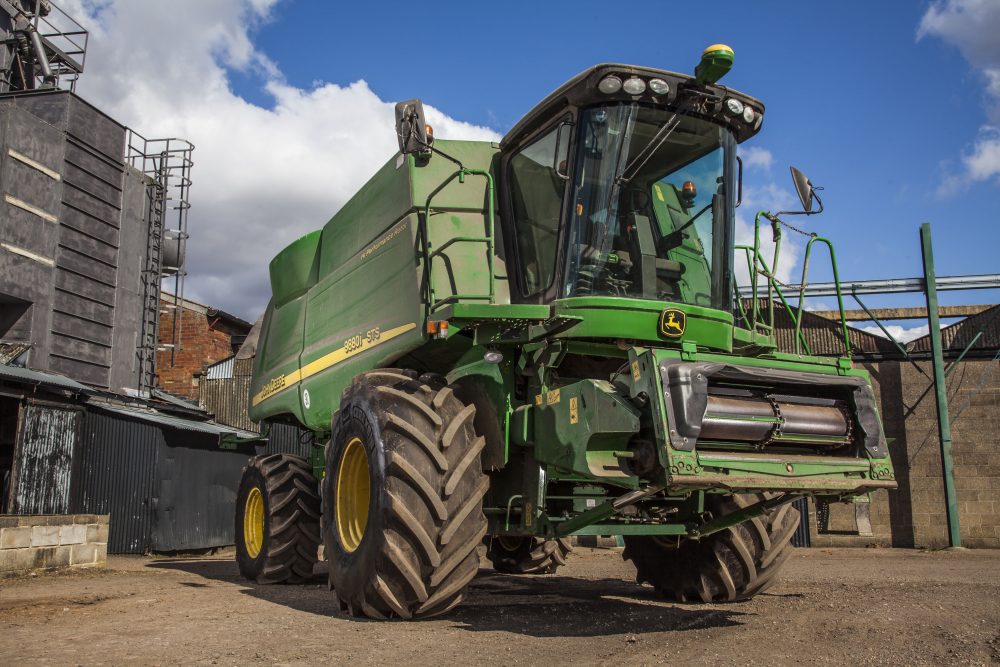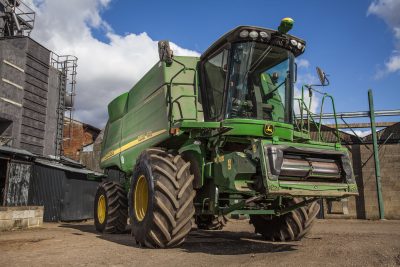Michelin is urging farmers to pay close attention to the health and condition of their tyres as they head into the harvest season.
Gordon Brookes, Customer Engineering Support Manager at Michelin, explains: “We would always recommend a thorough inspection of your harvester tyres before you get the machine out into the field, but this year it’s probably more important than ever.
“After the challenges of one of the wettest winters on record, followed by a very dry spring and the pressures of COVID-19, the last thing any farmer will want now is an issue with their tyres that could slow them down further.”
Here are Brookes’ 10 top tips to prevent tyre issues during harvest:
1. Check your combine harvester’s tyres for damage
During previous harvests tyres may have suffered accidental damage, leaving them with bulges, cuts or tears. Checking the tread area and sidewalls right down to the wheel rim will ensure that any problems can be detected as soon as possible. Leaving damage unchecked can result in costly tyre failure and harvest interruptions.
2. Check for flat spots
Long periods of inactivity can leave tyres with a ‘flat spot’ due to one section of the casing being deflected, creating massive vibrations on the road. To combat this, mark the affected area of the tyres, and move the combine into direct sunlight with other sections of the tyres deflected. If possible – inflate the tyres above your standard operating pressure and leave them for a couple of hours, whilst ensuring the manufacturer’s maximum inflation pressure is not exceeded. Warming the tyres in the sunlight will help the casing to return to its normal shape.
3. Check your tyre pressures
Ensure that tyres are inflated to the correct pressure in readiness for harvest, considering maximum cyclic load in the field and whether the combine will be used on side slopes or intensively on the roads.
4. Tyre choice
If you need new tyres, or a new machine, take tyre choice seriously. Tyre choice can make the difference between a good harvest and a great one. For most combines and foragers there is now a tyre that contains Michelin’s Ultraflex technology, which limits soil compaction and disturbance on headlands whilst offering greater operator comfort, manoeuvrability and load capacity.
5. Transport width
Is your combine harvester too wide for the road or gateways and would a narrower tyre speed up the harvesting process? If so, there are now harvester tyres that are narrower but have a greater contact with the ground. For example, a 900/60 R32 conventional tyre assembly could be replaced by a Michelin CerexBib 2 IF 800/70 R32 assembly, giving a 15 per cent larger footprint whilst making the machine 200mm narrower.
6. Rear tyres
Rear tyres can affect the efficiency of the combine harvester but are more commonly neglected. Farmers often don’t always realise that many of these tyres are designed for industrial machinery and require very high pressures which can cause damage on headlands. It’s therefore important to allocate the same time specifying rear tyres as you would the front set.
7. Regular tyre inspections
Daily tyre inspections can often be overlooked but are essential in prolonging tyre life and machine availability. Spotting cuts and tears as they appear helps ensure they can be repaired in a timely manner and limits machine downtime.
8. Watch those wheels
To prolong tyre life, wheels need to be kept in tip-top condition too. Kerbing or hitting a pothole can affect a machine’s wheel alignment, leading to rapid and uneven wear on the rubber.
9. Putting the brakes on
It’s common sense advice that accelerating slowly and braking progressively maximises tyre life. Easing off the brakes and making a conscious effort to accelerate gently can pay dividends in keeping rubber in service for longer.
10. Other tyres are just as important
Make sure that all machinery involved in the harvest is in excellent condition and tyres inflated to the correct pressure, not just the harvester itself. Consider grain carting as an example – is the road work intensive? If so, the tractor and trailer tyres need to be inflated accordingly to reflect this intensive operation.
For more information about the range of Michelin farm tyres available visit http://agricultural.michelin.co.uk or tweet @MichelinAgriUK.
Ends
Michelin, the leading mobility company, is dedicated to enhancing its clients’ mobility, sustainably; designing and distributing the most suitable tyres, services and solutions for its clients’ needs; providing digital services, maps and guides to help enrich trips and travels and make them unique experiences; and developing high-technology materials that serve a variety of industries. Headquartered in Clermont-Ferrand, France, Michelin is present in 170 countries, has more than 127,000 employees and operates 69 tyre production facilities which together produced around 200 million tyres in 2019. (www.michelin.com)
For further press information please contact:
David Johnson, Michelin Press Office
Tel: + 44 (0) 1782 402341 Email: d.johnson@michelin.com
Dan Jones or James Keeler, Garnett Keeler PR, Inver House, 37-39 Pound Street,
Carshalton, Surrey, SM5 3PG
Tel: +44 (0)20 8647 4467 E-mail: dan.jones@garnettkeeler.com / james.keeler@garnettkeeler.com
MICHOHT/245/20






